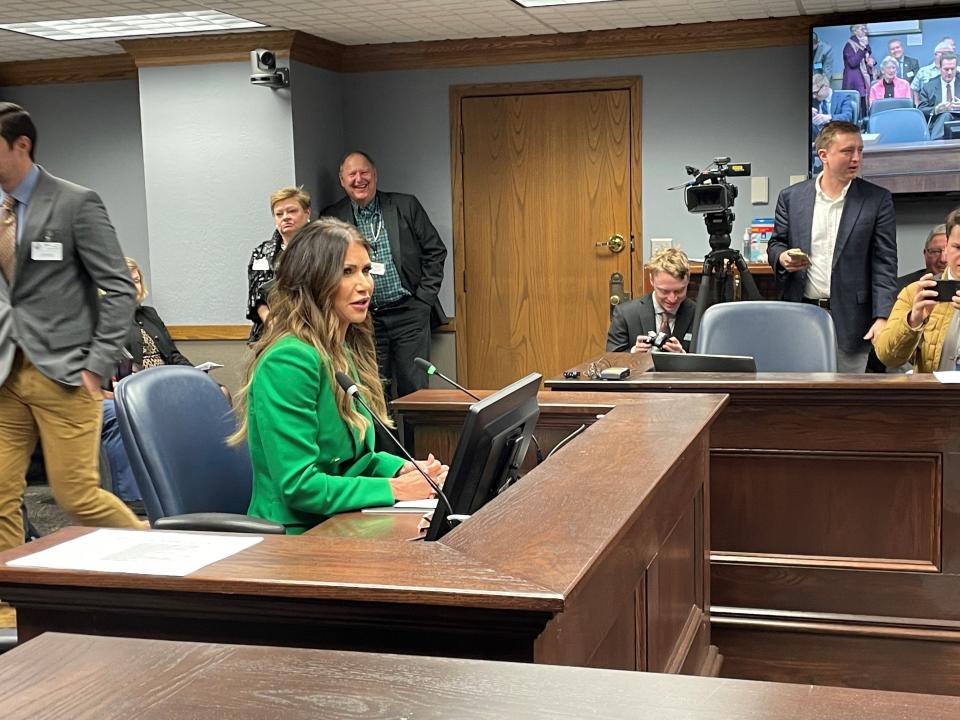Gov. Kristi Noem's proposal to cut sales tax on groceries dies in House committee
PIERRE — Like a pair of star-crossed lovers, three tax cut proposals and House Appropriators had their date with destiny Tuesday morning. It was well-known all three wouldn't make it out of committee, but the question remained, which one.
The only tax cut proposal that did was lowering the overall sales tax rate.
When the dust settled, Noem's proposal to lower the overall state sales and use tax on groceries to zero and a bill to provide a property tax cut were sent to the 41st Day. And while there's potential the food tax cut may be smoked out later during the House session Tuesday, House Republicans have made their commitment to lowering the overall sales tax.
The bill, HB 1137, brought by Rep. Chris Karr, R-Sioux Falls, would lower the overall sales and use tax from 4.5% to 4.2%, costing the state about $104 million, similar to what the food tax would have cost. It would also get rid of a 2016 law that's become a sticking point for lowering the overall sales tax rate: the Partridge Amendment.
According to the amendment, the state would reduce the overall sales tax half a percent, when and if the state started collecting sales tax on online retail sales. The amendment would also be triggered to reduce the sales tax 0.01% if year-over-year sales tax revenues increased by $20 million.
More:Revenues are set. Where does the South Dakota Legislature go from here with tax cuts?
Karr, armed with data about the state's revenue collection since 2017 when the Partridge Amendment was enacted, said that in 2022, nearly 11% of the state's tax collection came from online sales, about $1.896 billion.
Karr said the time was now, with a good economy and overall record breaking state revenue collection and projections for 2024, to cut the tax.
"When we decrease this, it's going to leave more discretionary dollars in the hands of individuals in South Dakota, they're going to be able to buy more, it's going to be good for the retailer," Karr said, adding this cut would still allow the state to continue funding Medicare providers and educators.
"I believe that this is very conservative in its approach to take some money and give it back," he said.
Noem's food tax cut didn't die without a fight though. The governor herself made a rare appearance in committee to testify in favor of her bill, HB 1075, sponsored by Rep. Mary Fitzgerald, R-Saint Onge.
Noem spoke to having spent more than a year crafting the proposal and speaking with South Dakotans on the tax relief that they most wanted. She added the proposal would impact all South Dakotans, from the senior citizens on fixed income to the single mother who rents.
Her re-election campaign introduced the proposal in September, and she visited multiple grocery stores across the state to speak with shoppers.
"I've been in this Capitol for many years now and I've seen every year as the debate goes on and on with lobbyists who want education policy... what we should do for different needs that the state has," Noem said. "It's about time someone shows up for the taxpayer."

She reminded legislators that a ballot initiative that is currently gathering signatures would also reduce the tax on groceries, however, it would not just be the state tax but also the municipality tax collected.
"It's going to pass," Noem said. "We'll be back here in two years trying to figure out how to do another $102 million tax and Republicans, Democrats and people who represent the state need to look responsibly toward the future."
Before the 8-1 vote, Rep. John Mills, R-Volga was the lone no vote, to send HB 1075 to the 41st Day, Republican lawmakers on Appropriations thanked Noem for her leadership on the issue as well as giving her credit for leading the state through unprecedented times.
"We're sitting here today because of that leadership and because of the strength of our economy, because of those decisions that we made," Rep. Tony Venhuizen, R-Sioux Falls, said. "We can sustain any of these three tax cuts today, because of the strength of our economy. We have to make a tough vote."
Rep. Mike Derby, R-Rapid City, called it the most important vote in his nine-year tenure as a legislator.
More:Live updates: Blizzard warning issued for southeastern South Dakota
Afterward, Noem took questions from reporters, one of the only times in the past two months of the legislative session she's done so. She said she was disappointed by the committee's actions, but promised to keep working on the issue.
"I am extremely grateful that they're now talking about cutting taxes," Noem said. "They weren't doing that a few months ago. So the only reason they're having the conversation today about cutting taxes is I think that they realize that I'm not leaving the session without cutting taxes."
Noem and Rep. Will Mortenson, R-Pierre, both said the two sides were in disagreement on how to provide tax relief to residents. Mortenson said he hoped the executive and legislative branches could continue to work well together.
The bill to cut the overall tax relief now heads to the House floor for debate. If it passes, it'll go over to the Senate.
Mortenson anticipated the conversation around the tax cut to continue into March, because of the Senate's "tepid" feelings around the issue.
"I think that's just because they're waiting to see how the budget shakes out," he said.
This article originally appeared on Sioux Falls Argus Leader: Noem's move to cut sales tax on groceries killed in House committee

